|
|
Harnessing the sun’s power to generate electricity has become increasingly popular in recent years. In 2021 alone, around 4.4% of total global energy came from solar power. There’s no doubt that today, more and more people recognize the importance of transitioning to renewable energy sources.
Solar panels provide a clean and sustainable way to produce electricity, which can help reduce your carbon footprint and save money on your energy bills. That’s why, as a solar panel owner or prospective buyer, it’s essential to understand how proper maintenance can maximize the efficiency and lifespan of your solar energy system.
Proper upkeep not only prolongs the life of your solar panels but also guarantees that they deliver optimal results in terms of energy production.
In this article, we explore common aspects of solar panel maintenance. Read on to learn the secrets of maintaining your solar panels for optimal efficiency and ensure that your investment continues to pay off for years to come.
Key Takeaways
- Solar panel efficiency depends on temperature, location, orientation, shading, and cleanliness.
- Regular maintenance, including cleaning, extends the lifespan and efficiency of solar panels.
- Avoid shaded areas when installing solar panels to maximize power output.
- Always consult professionals for panel repairs or replacements.
- For optimal solar panel efficiency, align the installation angle with the latitude of the location.
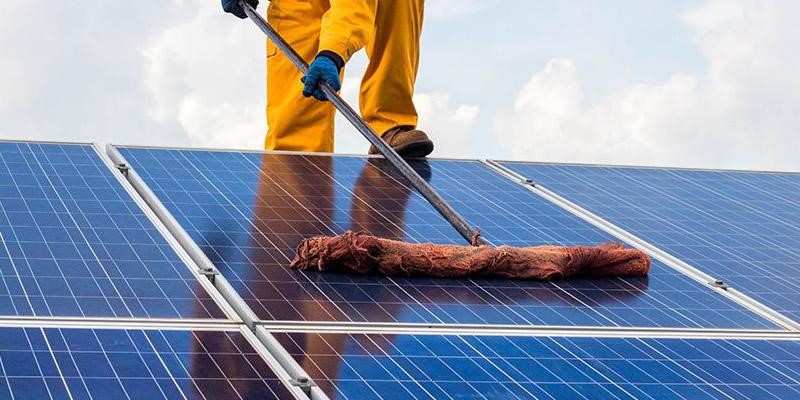
Do Solar Panels Require Maintenance?
Solar panel maintenance is a crucial aspect of ensuring that your renewable energy investment remains efficient and functional throughout its lifespan.
While solar panels are known for their durability and low-maintenance requirements, it’s still essential to perform regular checks and cleaning to maintain optimal performance. Inadequate care can lead to inefficiencies, reduced power output, and even permanent damage in some cases.
Solar panel maintenance involves a variety of tasks, including cleaning, inspection, and addressing any issues that may arise. That’s why developing a comprehensive maintenance plan and adhering to it consistently is an excellent way to maximize the efficiency of your solar energy system and prolong its life.
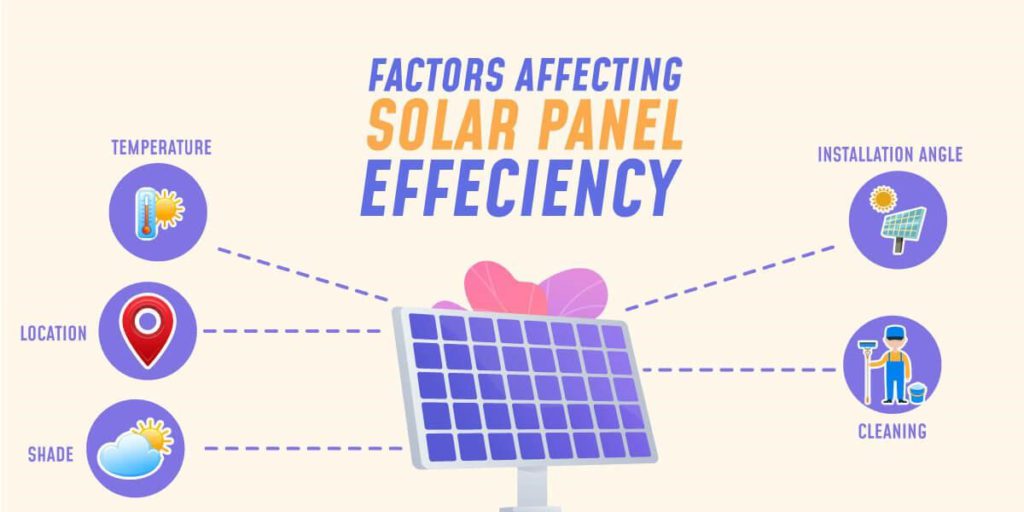
Factors Affecting Solar Panel Efficiency
The efficiency of a solar panel, or how well it can convert sunlight into usable electricity, can be influenced by a variety of factors. Here are some of the key ones:
Temperature
While solar panels thrive on light, they aren’t as fond of heat. The efficiency of solar panels tends to decrease as temperatures increase.
Most panels are tested at a temperature of 25°C (77°F). Performancedecreases as the temperature rises above this point, generally by about 0.5% for every degree Celsius. Therefore, it’s vital to have good ventilation and possibly cooling mechanisms to prevent overheating and ensure the panels work efficiently, especially in places with particularly hot climates.
Location
The geographical location of solar panels significantly impacts their efficiency due to a number of factors:
- Latitude. Solar panels are more efficient near the equator and less efficient closer to the poles due to the Earth’s tilt.
- Sunshine hours. More sunlight hours means more power generation. This factor varies by location and season.
- Climate. Sunnier, drier climates are generally better for solar power than cloudier, rainier ones.
- Altitude. Higher altitudes can receive more solar radiation as sunlight has less atmosphere to travel through.
- Orientation. In the northern hemisphere, panels should face true south, and in the southern hemisphere, true north for maximum sunlight exposure.
Shade
Shade can be a significant obstacle to solar panel efficiency. If a part of the panel becomes shaded, for instance, by a large tree, it doesn’t just decrease power output proportionally to the shaded area; it can decrease the output of the whole panel or even multiple panels if they’re connected in series.
This is because a shade can make the shaded solar cell resistive, blocking the flow of electricity. Therefore, solar panels should be installed in areas free of shadows for as much of the day as possible.
Installation Angle
The tilt angle of solar panels significantly influences their efficiency. The ideal angle for solar panels is typically equal to the latitude of the installation location. The aim is to position the panels perpendicular to the sun’s rays for the most direct sunlight.
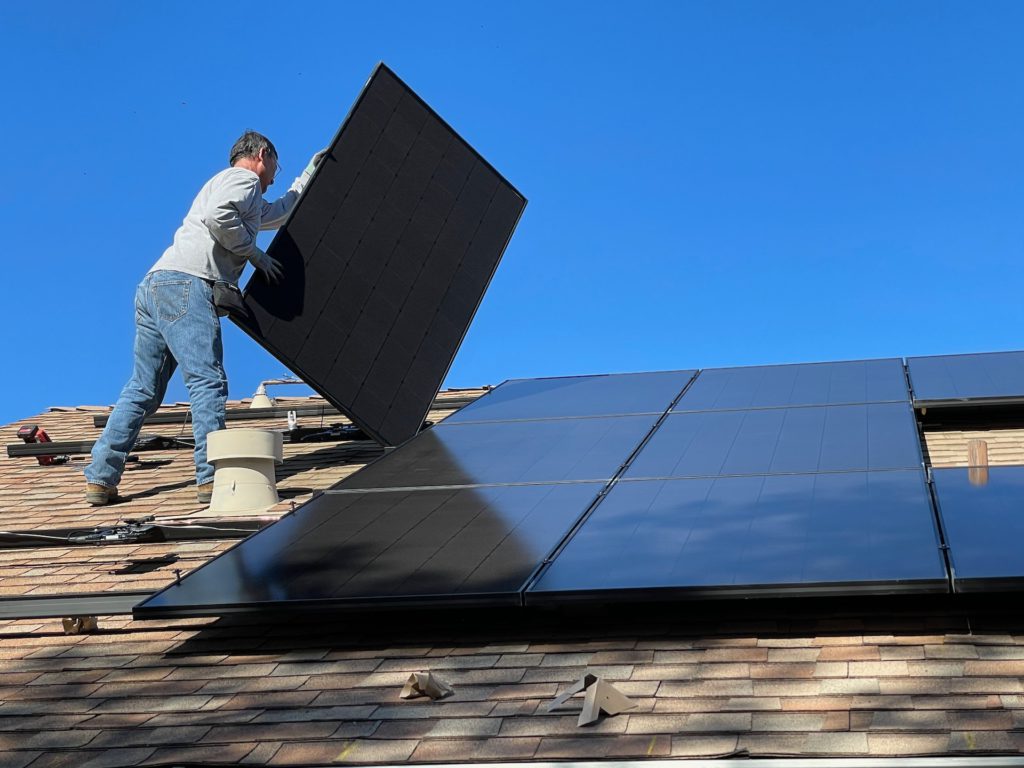
This is why solar panels in the Northern Hemisphere generally face south and are tilted to an angle equal to the latitude and why the opposite applies to solar panels in the Southern Hemisphere.
Cleaning
Dust, dirt, pollen, bird droppings, and other forms of debris can accumulate on the surface of solar panels and block sunlight from reaching the cells. This can significantly decrease the power output.
Hence, cleaning and maintaining solar panels regularly is crucial to keep their efficiency high. However, it’s essential to follow the manufacturer’s guidelines for cleaning to avoid damage. In many cases, rainfall will also naturally help to keep panels clean.
Do’s and Don’ts of Solar Panel Cleaning
If you have titled solar panels and live in a place with regular rainfall, you’re in luck: rain should be able to wash away the majority of dust and debris off of them. However, it’s crucial to physically clean your solar panels during the dry season or prolonged dry spells.
Do’s:
- Clean in the morning or evening. Cleaning the panels when they’re cool (such as in the early morning or late evening) can prevent cracking that may be caused by sudden temperature changes.
- Use soft materials. Use a soft brush or a squeegee with a plastic scraper edge coupled with a gentle detergent to clean the panels. Hard or abrasive materials could scratch the glass on the panels, reducing their efficiency.
- Check the manufacturer’s instructions. Always check the cleaning guidelines provided by the manufacturer. Some manufacturers may have specific cleaning instructions or recommendations.
- Check panels regularly. Monitor the panels regularly to check for dirt, dust, bird droppings, leaves, or other debris that could reduce efficiency.
Don’ts:
- Don’t use high-pressure water. Avoid using a pressure washer to clean the panels, as the high pressure could cause damage.
- Don’t walk on the panels. Never step on the panels to clean them, no matter how sturdy they seem. This could lead to cracks or damage to the cells inside.
- Don’t neglect professional cleaning. If the panels are too high, hard to reach, or if they’re significantly dirty, hire a professional solar panel cleaning service. They have the appropriate tools and expertise to clean the panels safely and effectively.
What’s the Maintenance Difference Between Ground-Mounted Panels vs. Rooftop Panels?
The main distinction regarding the maintenance of ground-mounted and rooftop solar systems lies in their ease of access. Ground-mounted solar panels are generally easier and safer to reach than rooftop ones. This accessibility simplifies routine maintenance tasks, including cleaning and inspection.
When debris accumulates, or snowfall covers the panels, it’s also typically easier to clear it off of ground-mounted panels. A simple tool, such as a soft-bristled broom, can effectively sweep off the debris or snow without scratching or damaging the solar panel’s surface.
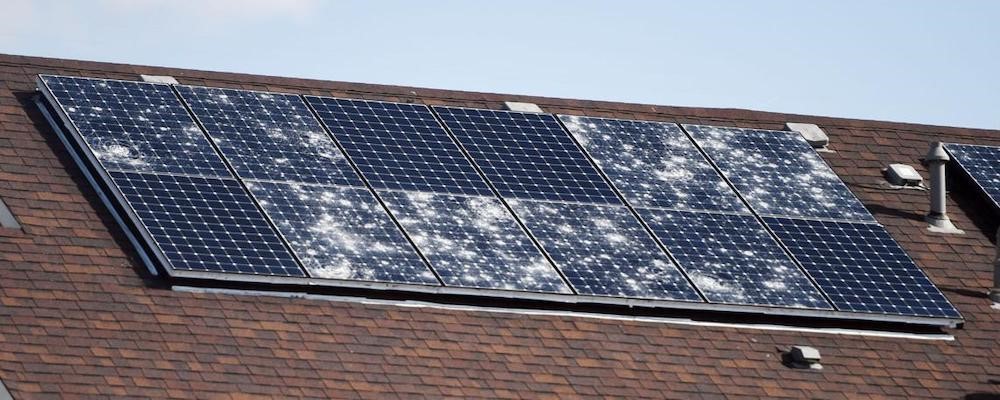
What to Do if You Need to Repair or Replace Solar Panels?
If you need to repair or replace your solar panels, follow these steps:
- Assess the damage. The first step is to figure out what the issue is. Check for visible signs of damage like cracks, discoloration, or water leaks. Some issues may not be visible and might be noticed as a drop in power output or efficiency.
- Consult your solar provider. Once you have assessed the damage, reach out to your solar provider. They’ll be able to offer expert advice and may provide remote troubleshooting or send a technician to inspect the system.
- Check the warranty. Solar panels typically come with two types of warranties: a performance warranty that guarantees a certain level of power output over a period (usually 25 years) and a product or equipment warranty. The latter usually covers manufacturing defects, environmental issues, and premature wear and tear (typically about 10-12 years). If your panels are still under warranty, the manufacturer should replace or repair them at no cost.
- Work with a professional. Never try to repair solar panels by yourself, as you might cause more damage or injure yourself. Always rely on professionals who are trained to work with electrical systems.
- Replacement. If your solar panels can’t be repaired, you’ll need to arrange for them to be replaced. If only one or two panels are damaged, you might not need to replace the entire system. Make sure that the new panels are compatible with your current system.
- Disposal. If a panel needs to be disposed of, ensure it’s done in an environmentally friendly manner. Some manufacturers take back and recycle old panels, or you can contact a local electronic waste recycler.
In Conclusion
Maintaining and optimizing the efficiency of your solar panels is essential for ensuring optimal solar panel efficiency. However, factors like temperature, location, shading, installation angle, and cleanliness significantly influence solar panel efficiency. That’s why regular inspections and cleaning are integral to ensure optimal performance and longevity of your system.
While some upkeep tasks can be managed independently, it’s better to rely on professional services for repair or replacement tasks. When performing maintenance tasks, remember to follow the manufacturer’s instructions closely and to properly dispose of damaged panels.
With proper care, your solar panels can provide a clean, cost-effective energy solution for many years to come!
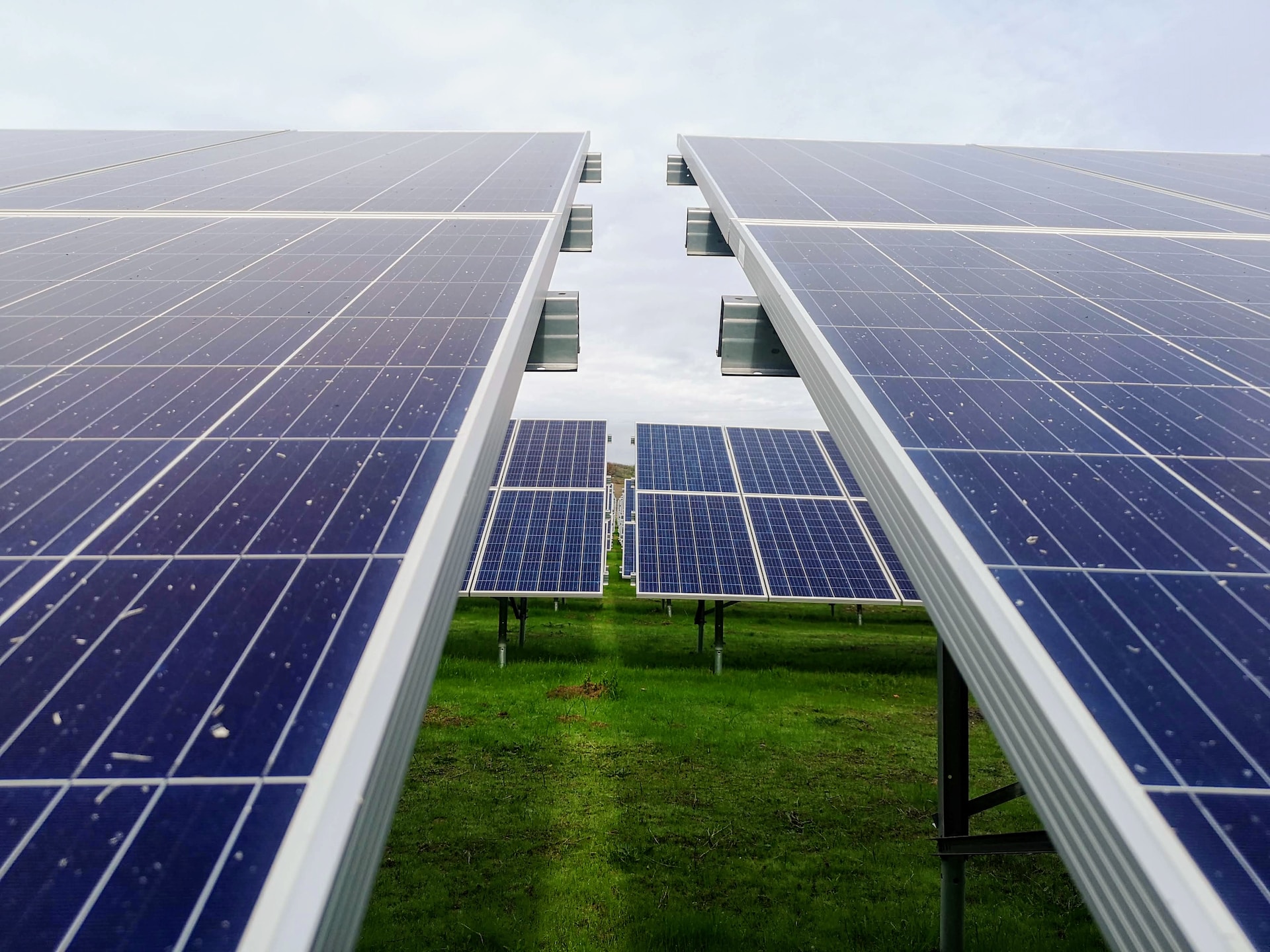



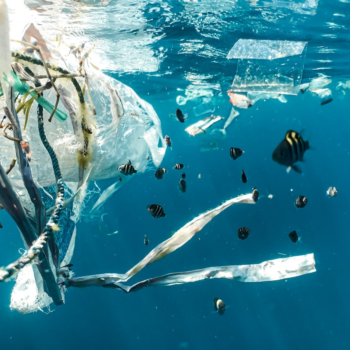
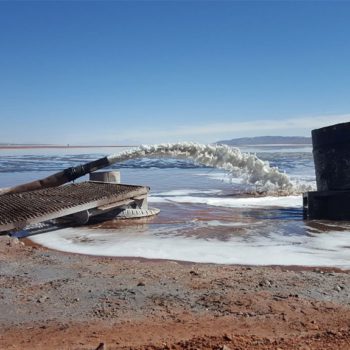







No Comments